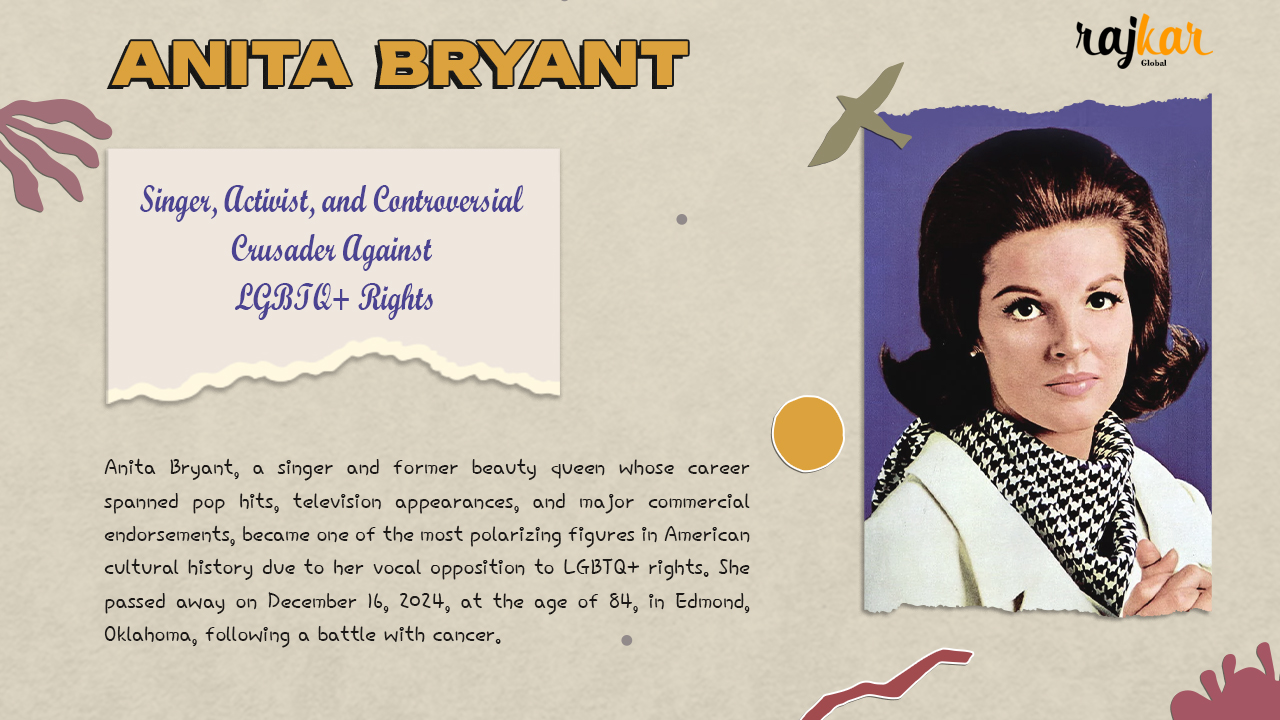Anita Bryant is an American singer, former beauty queen, and controversial political activist. She rose to fame in the 1950s and 1960s as a popular vocalist, with hits such as “Paper Roses.” She also gained prominence as a spokesperson for the Florida Citrus Commission in the 1960s and 1970s, becoming closely associated with orange juice in her promotional campaigns.
However, Bryant is perhaps most widely known for her role in anti-LGBTQ+ activism in the late 1970s. In 1977, she founded the “Save Our Children” campaign, which sought to repeal a local ordinance in Dade County, Florida, that prohibited discrimination based on sexual orientation. The campaign succeeded in overturning the ordinance, but it also sparked significant backlash and marked a turning point in the LGBTQ+ rights movement, galvanizing activists nationwide.
Bryant’s activism led to a decline in her popularity and career, with boycotts and protests against her work. Over the years, her legacy has remained polarizing, with some viewing her as a defender of traditional values and others as a symbol of discrimination.
She passed away on December 16, 2024, at the age of 84, in Edmond, Oklahoma, following a battle with cancer.
What made Anita Bryant popular was
1. Music Career:
- Bryant’s singing career brought her national recognition with hits like “Paper Roses” and “In My Little Corner of the World.”
- She performed on major television programs and at various events, showcasing her talent and charm.
2. Advocacy and Anti-LGBTQ+ Activism:
- In the late 1970s, Bryant led a campaign to repeal an anti-discrimination ordinance in Dade County, Florida, that protected gay and lesbian individuals.
- Her group, Save Our Children, argued against the ordinance, using rhetoric that many viewed as deeply prejudiced.
- The campaign succeeded in repealing the ordinance in 1977, but it also galvanized the LGBTQ+ rights movement nationwide.
3. Backlash and Legacy:
- Bryant faced significant backlash from LGBTQ+ advocates and allies. She became a symbol of anti-LGBTQ+ sentiment and a target for protests and boycotts.
- The controversy damaged her career and public image, with contracts and endorsements drying up over time.
- Despite her influence in the 1970s, her activism is often viewed as a catalyst for the rise of organized LGBTQ+ activism in the United States.
4. Later Years:
- Following the collapse of her career and public life, Bryant largely retreated from the spotlight.
- She has made occasional public appearances and statements but remains a divisive figure in discussions about civil rights and cultural history.

Vinod Ram has been in Software Industry since 2006 and has experience of over 16 years in Software Development & Project Management domain specialised majorly in LAMP stack & Open Source Technology, building enterprise level Web based Application, Large Database driven and huge traffic Websites and Project Management.
He loves to write information articles and blog to share his knowledge and experience with the outside world and help people to find solution for their problems.
